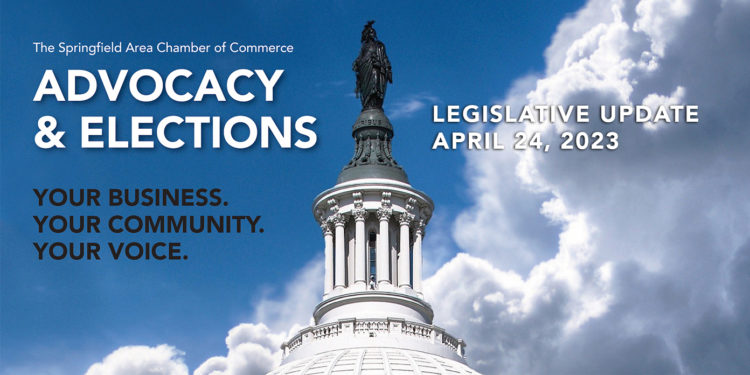Legislative Update: April 24, 2023

We’re monitoring Oregon’s 2023 legislative session for issues of impact and interest to our members. Here’s the latest update from our legislative counsel at the Oregon State Chamber of Commerce (OSCC).
100 days down – 60 days left.
The 2023 legislative session is meandering along. A positive characterization of the session to date is that the legislature has stuck to the mostly pragmatic work of balancing the budget and aligning it with some key policy objectives (eg. housing and programs for homeless, and semiconductor incentives). On balance, it has done little harm to the business environment of the state.
The most significant business headlines of the past week didn’t even stem from the legislature – they came from the blockbuster announcement that Roseburg Forest Products would invest $700 million to expand its Douglas County operations and also the monumental decision by the Federal Ninth Circuit Court of Appeals to invalidate the City of Berkley’s ban on natural gas hookups in new construction.
Democratic leadership introduced SJR 33 which would enshrine equal protection provisions in the Oregon Constitution for gender, abortion rights, gender identity and sexual orientation.
SJR 33 is slated to move quickly and would go before voters in November 2024.
But again, from a business perspective, the session will likely produce little change.
General outlook
Generally speaking, we are forecasting that the 2023 session will pose few changes or challenges to general business operations in Oregon. With some exceptions, almost no big anti-business bills have survived to date – they have either been watered-down or died altogether. We are watching, however, HB 3568 which would appear to be the first attack on industries that use quotas as a production management tool.
State Budget
As it stands right now, the state budget is balanced. The legislature has the money it needs to pay its bills and keep state government operating on current service levels. However, there is not a lot of room to maneuver. The only conflict that is emerging here is that Governor Kotek wants to use up to $1 billion of reserve funds to increase spending while legislative leaders prefer to spend less and not use any reserve funds.
Early Legislative Priorities
The legislature to date has prioritized housing policy and funding to address homelessness (HB 2001) with nearly $200 million of additional investment. In addition, the legislature has largely galvanized around a very modest proposal to incentivize semiconductor manufacturing (SB 4) with another $200 million of state investments designed to attract a portion of the $50 billion contained in the federal CHIPS Act.
Issues of Contention
In addition to the aforementioned SJR 33, we are seeing the majority Democrats use their political muscle to push through progressive social policies.
The House will focus on access to abortion and gender-affirming services (HB 2002) as well as some gun control measures (HB 2005). The Senate appears focused on a floundering rent control bill (SB 611) as well as a re-write of the Measure 114 gun control measure (SB 348) which will also likely not pass. We remain concerned about the steady march toward a single payer health system in Oregon that inches forward with SB 704 and now SB 1089.
But overall, we are not seeing an aggressive partisan push on business policies as we’ve seen in the past.
Current OSCC Issues
Interstate Bridge Replacement (HB 2098): The Joint Transportation Committee unveiled their bill that would authorize $1 billion for the replacement of the Interstate Bridge that connects Oregon with Washington.
Restrictions on Production Quotas in Warehouses (HB 3568): OSCC is currently concerned with this bill as it assumes that workplace production quotas lead to unsafe workplaces. We are also concerned that the bill creates a never-ending cycle of potential retaliatory complaints against warehouse employers. OSCC opposes the bill in current form..
First party lawsuits on insurance claims (HB 3242 and HB 3243): Allows policy holders to sue their insurance companies for bad faith. These bills have been tried in other states and have benefitted few but resulted in significant premium spikes in commercial policies for all. These bills passed the House on party-line votes. OSCC will oppose these bills in the Senate.
DEQ Title V permit fees (HB 3229): This bill is a massive 80% increase in Title V air emissions fees implemented by DEQ. Will hurt local manufacturers as permit costs are increased to save DEQ regulator positions. The bill also allows DEQ to raise additional fees without legislative approval. OSCC opposes this bill in current form.
Other bills still alive the OSCC supports include:
Increased estate tax exemption (HB 2426): Legislators are starting to express concern that Oregon’s estate tax is being levied on middle income Oregonians due to high real estate values.
Increased CAT Tax exemption (HB 2433 / SB 127): OSCC continues to be optimistic that a solution can be found that would increase the CAT tax threshold to as high as $5 million from the current level of $1 million.
Hiring and Retention bonuses (HB 3205): This bill would allow employers to begin to offer hiring and retention bonuses again as current state pay equity laws have made these bonuses legally tenuous. This bill will advance.
Alignment of Employee Leave Policies (SB 999): This bill undertakes the work of aligning disparate employee leave policies (OFLA, FMLA, and Paid Leave) to ensure that these laws do not allow employees to “stack” these protected leaves.
The Springfield Chamber of Commerce will be publishing the OSCC’s legislative updates weekly, or as received. Any opinions expressed or implied are those of OSCC and do not necessarily reflect those of the Springfield Chamber or its representatives. If you’d like more information, please visit our Advocacy & Elections Page.
Discover more from Springfield Bottom Line
Subscribe to get the latest posts sent to your email.





